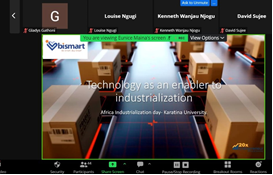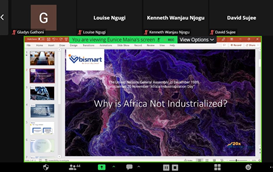Karatina University recognizes Kenyan technopreneurs
Karatina University celebrated this Day in order to recognize Kenyan technopreneurs who have invested in innovation and brand recognition. Such entrepreneurs, the Vice Chancellor noted, have made it easier for Kenya to be viewed as a techno hub that develops technological innovations that can be used by the Kenyan industrialist to produce competitive products.
‘Karatina University has produced a technopreneur who is revolutionizing the electronics industry not only in Kenya but also in Africa. Anthony Muthungu has demonstrated that with the right training, policies and mentors, indigenous manufacturing firms can compete with multinational firms in the global market. He is a role model to many young industrialists who are keen on developing business models that lead to economic diversification,’ he said.
The University is building up its Innovation Hub with the intention of developing technopreneurs who will introduce new products and services in the Kenyan market with minimal resources. They will develop value chains across various industries and, in the process, reach out to markets that were once considered ideal for imported goods.
Use technology to harness available opportunities
In her presentation on “Digital Scalability and Growth in Africa’s Industrialization”, Ms. Maureen Mwaniki, the Vice Director Programs Management Department, Huawei Kenya Limited defined a technopreneur as a person who challenges the usual way of doing things and comes up with a different way of doing things.

‘A technopreneur uses technological solutions to change the way of doing things in order to impact the world. Technopreneurship identifies a gap and brings in a solution to fill that gap.’
According to her, there is need to incorporate technology in order to harness available opportunities in business, health care and commerce among others. She highlighted a number of key drivers necessary to scale up technopreneurship. Top among them is understanding the needs of the customer in order to provide a solution that is actually needed. It is also important to identify where to get resources which will help advance a process or upon which to build an idea. It is for this reason that productive collaborations have the potential to spur the growth of a business beyond borders. However, it is important to be aware of the cultural space of different places. This cultural awareness will be handy in identifying the resources to make an idea scalable.
Insurance Company that meets the needs and fears of the customer
The Founder and Chief Executive Officer, Bismart Insurance, Mrs Eunice Maina-Mburu, in her presentation “Technology as an enabler of Industrialization” detailed how she built Bismart Insurance in order to meet the needs, and the fears, of the customer.

‘I built Bismart Insurance in order to position insurance in a way that people would want to buy it. I realized that customers had a lot of mistrust with insurance companies due to lack of transparency, the complexity of insurance products as well as their affordability.’
Bismart Insurance is an online platform that was developed and designed to solve these problems. It uses technology as an enabler in the identification and use of these insurance products. The app enables the user to buy insurance the same way someone can buy air tickets.
‘This is a comparison platform where a user is able to compare products and the available packages. The user is also able to choose from a multiple of insurance companies. It also breaks down insurance into understandable terms,’.
Bismart Insurance has been able to design products to fit the African definition of a family. It has also partnered with financiers to build a credit application that is able to advance credit to users.
‘My advice is that in order to industrialize or develop, let us look at a problem as a whole. At times, there has been a gap between product developers and the customer. Technology should solve a problem. We should build local solutions to address local problems.,’ she concluded.




